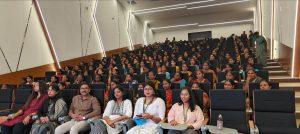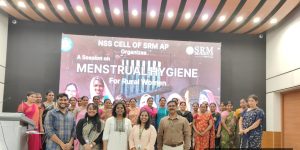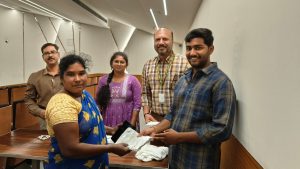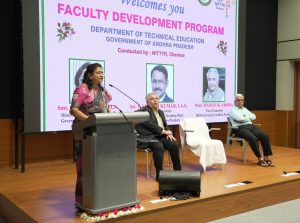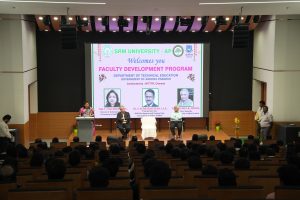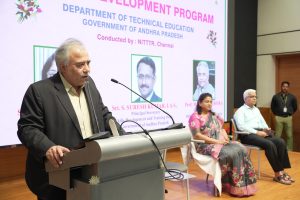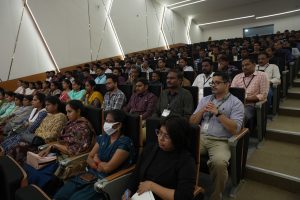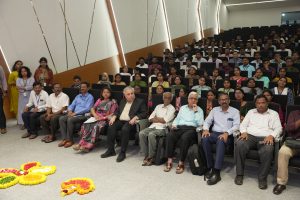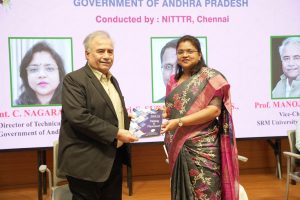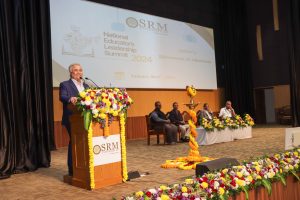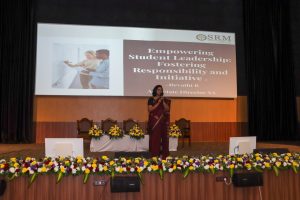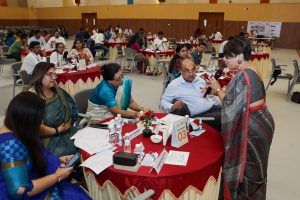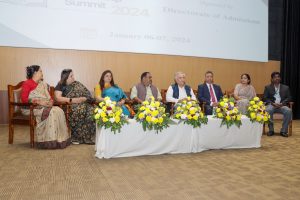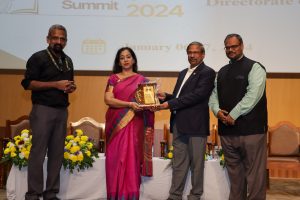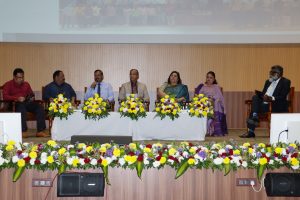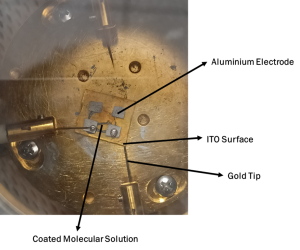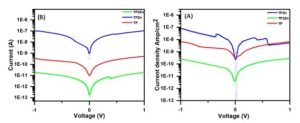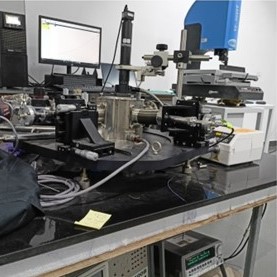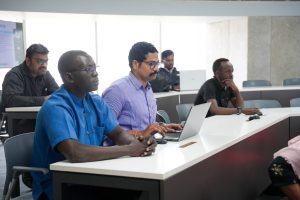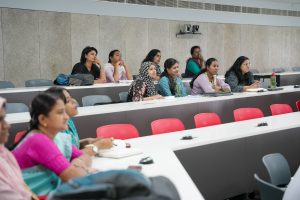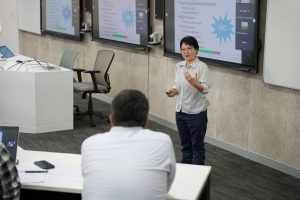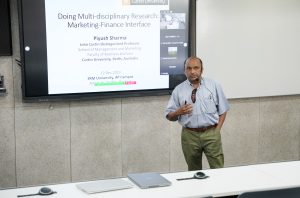AESEE 2024 Receives Grants from the Ministry of Jal Shakti
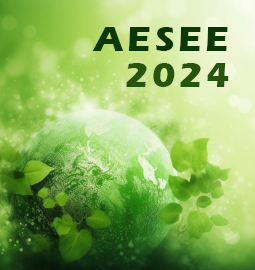
The Department of Environmental Science and Engineering is thrilled to share the exciting news regarding its upcoming 1st International Conference on Advances in Environmental Sustainability, Energy, and Earth Science (AESEE 2024). The Department of Water Resources, River Development, & Ganga Rejuvenation (DoWR, RD & GR), the Ministry of Jal Shakti, have generously sanctioned Rs. 5 lakhs to support this groundbreaking event.
The International Conference scheduled to take place from March 14 – 16, 2024 aims to explore innovative advancements in science and technology while promoting inclusive growth across various sectors. This collaborative approach between environmentalists and the academic community will ensure a sustainable future.
The financial grant sanctioned in this regard underscores the importance of AESEE 2024 and highlights the commitment of the Department to advancing knowledge in the field. AESEE 2024 promises to facilitate meaningful discussions, bringing together diverse stakeholders to contribute to a more sustainable and interconnected future.
- Published in Departmental News, ENVS News, News
NSS Cell Illuminates Women on Menstrual Hygiene
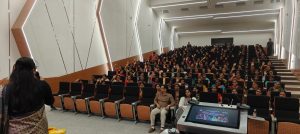 In a dedicated effort towards community welfare, the NSS Cell of SRM University-AP orchestrated a transformative awareness session on Menstrual Hygiene for rural women. Delivered by our esteemed University Counsellors, the session aimed to empower and educate women from nearby villages on essential menstrual hygiene practices.
In a dedicated effort towards community welfare, the NSS Cell of SRM University-AP orchestrated a transformative awareness session on Menstrual Hygiene for rural women. Delivered by our esteemed University Counsellors, the session aimed to empower and educate women from nearby villages on essential menstrual hygiene practices.
The engaging session delved into addressing the challenges faced by these women and dispelling myths surrounding menstruation. Harnessing the power of videos and captivating story narrations, the University Counsellors brought forth crucial information to raise awareness about this natural biological process.
Despite menstruation being a universal phenomenon, many rural women grapple with inadequate knowledge and resources, resulting in health complications, social stigma, and daily life limitations. The NSS Cell’s initiative sought to bridge this knowledge gap and provide practical insights.
Despite menstruation being a universal phenomenon, many rural women grapple with inadequate knowledge and resources, resulting in health complications, social stigma, and daily life limitations. The NSS Cell’s initiative sought to bridge this knowledge gap and provide practical insights.Through impactful story narrations, the session aimed to instill a sense of empowerment and confidence among the women, enabling them to manage menstruation with dignity. The Counsellors addressed prevalent myths surrounding menstruation, fostering an environment of openness, and understanding to eliminate social stigmas. Utilizing the visual medium, informative videos were showcased to provide a comprehensive understanding of menstrual hygiene practices. The overarching goal of this initiative was to ensure that every woman, irrespective of her background, gains access to vital information and resources for a healthier, stigma-free life.
SRM University-AP remains committed to its role as a catalyst for positive change, uplifting communities, and fostering holistic well-being.
- Published in Departmental News, News, student affairs news
NITTTR Faculty Development Programme : Empowering Polytechnic Educators
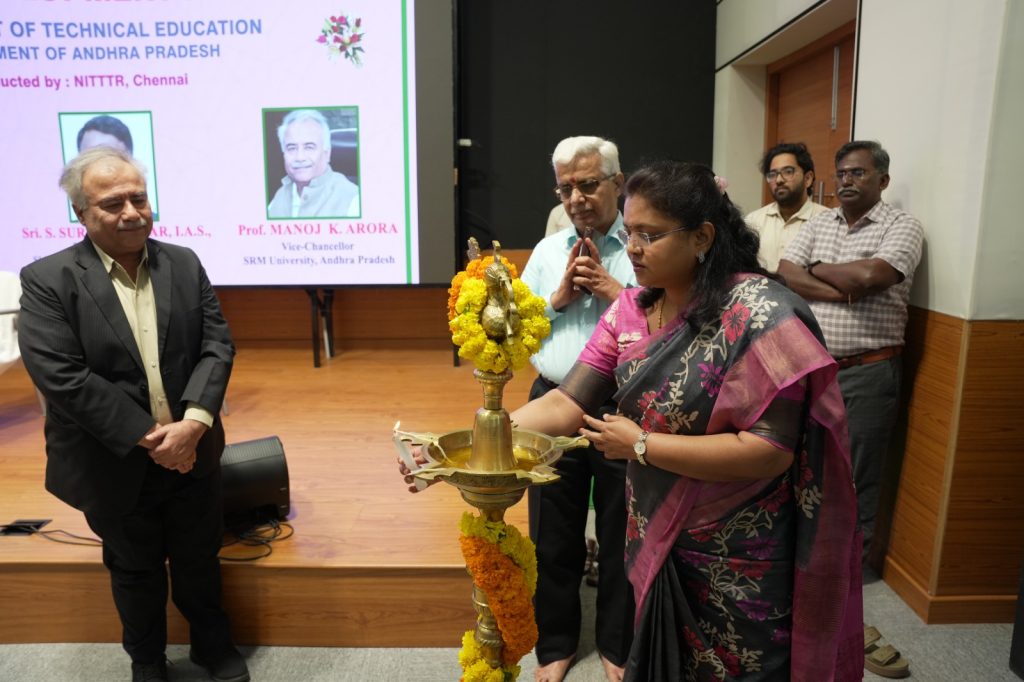
The National Institute of Technical Teachers’ Training and Research (NITTTR), Chennai conducted a six-day transformative Faculty Development Programme (FDP) at SRM University-AP. The FDP is tailored for Polytechnic educators from across the state of Andhra Pradesh. This initiative aligns with the NITTTR’s recent educational reforms, specifically the revamping of their curricula. Distinguished guests, including Director of Technical Education and IAS officer Ms C Naga Rani; SRM University-AP Vice Chancellor, Prof. Manoj K Arora; and Prof. Nagendra Rao, a distinguished Professor at NITTTR, Chennai along with other senior members of the fraternity graced the occasion.
In an inspiring address, Prof. Arora urged educators to transcend the conventional role of a teacher. He stated, “Do not take teaching as a mere job, a teacher is no more just a teacher, he/she is also a facilitator and mentor.” He stressed upon the importance of collaborative learning, encouraging educators to work hand in hand with students.
Furthermore, Prof. Arora extended the varsity’s support to the delegates in utilising the services of the university’s Teaching and Learning Centre (TLC), a platform that equips the faculty and students to enhance and evolve the teaching and learning pedagogy.
The Director of Technical Education in her address stated the need to regard “the youth as the symbol of the nation’s energy and hope.” She implored the educators to motivate more female students to pursue technical education. Prof. Nagendra Rao elucidated the manifold benefits the FDP brings to faculty and, consequently, the students.
- Published in News
“Shaping Leaders of Tomorrow”- National Educator’s Leadership Summit 2024
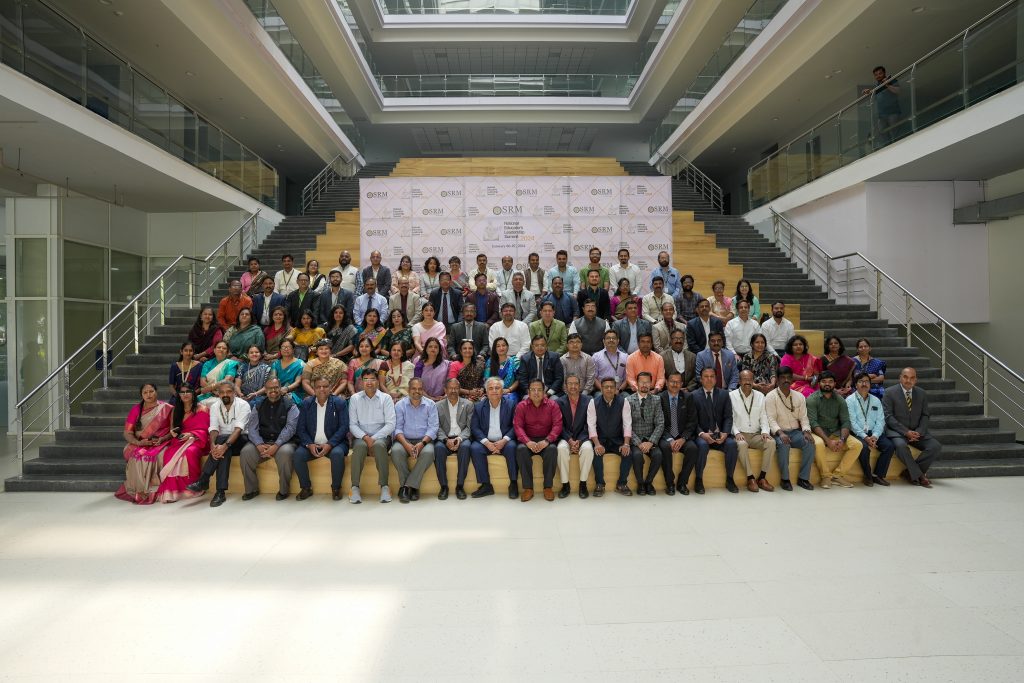
“Schools and universities must join hands for the future of our students”, commented Prof. Manoj K Arora, Vice Chancellor, SRM University-AP, in his session on the Future Trends in Education at the National Educator’s Leadership Summit 2024 organised by the varsity on January 06-07, 2024. The two-day Educational Conclave, under the aegis of the Directorate of Admissions, hosted 45 school principals from across 26+ cities in India who participated in addressing the future of national education and the need for emphasising holistic development, skill enhancement and learner-centric approach to empower students and nurture the skills and knowledge essential for their professional growth.
Prof. Y Siva Sankar, Director – Admissions, SRM University-AP remarked that the Summit facilitated a dynamic platform to exchange ideas, share practices and collectively chart strategies to implement reforms that will shape the education system of our nation.
Insightful sessions, panel discussions, and interactive lectures were the highlights of the summit. The first day of the conclave featured informative sessions on Empowering Student Leadership, Raising Awareness of Emotional Intelligence in Students, Enhancing Student Entrepreneurship, Effective Classroom Management Techniques and Challenges in Indian Education by the deans and academic leaders of the university. “Students learn by themselves; Creating ideas and building innovations through digital literacy. It is time we adopt an experiential learning approach to disseminate them with skills for the global world”, commented Surajit Sen, Principal – Jharkhand Public School during an exchange of views on present Indian education.
Discourses on Future Trends in Education and Insights from Directors of SRM University-AP in promoting Entrepreneurship, Higher Studies and International Collaborations on the final day provided valuable insights to principals encouraging them to implement transformative initiatives in their curriculum to foster holistic development in students.
The National Educator’s Leadership Summit successfully concluded with Dr R Premkumar, Registrar; Prof. Y Siva Sankar, Director- Admissions; and Prof. Vishnupad, Dean – Easwari School of Liberal Arts honouring the participating principals with a memento as a token of gratitude for their dynamic participation in the conclave striving towards the collective cause of transforming the future of Indian education.
- Published in News
Unveiling a Realm of Possibilities in the Field of Material Science
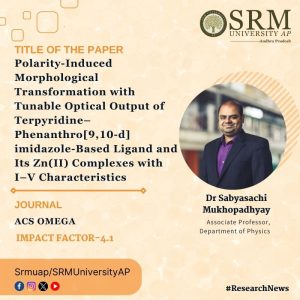 Dr Sabyasachi Mukhopadhyay, Associate Professor in the Department of Physics at SRM University-AP recently published a paper, titled “Polarity-Induced Morphological Transformation with Tunable Optical Output of Terpyridine–Phenanthro[9,10-d] imidazole-Based Ligand and Its Zn(II) Complexes with I–V Characteristics,” in the prestigious journal “ACS Omega.” Notably, “ACS Omega” is a Q1 journal with an impact factor of 4.1. This groundbreaking work delves into the polarity-induced morphological transformations and tunable optical outputs of Terpyridine–Phenanthro[9,10-d] imidazole-based ligands and their Zn(II) complexes. The study also explores their I–V characteristics, contributing valuable insights to the realms of materials science and chemistry.
Dr Sabyasachi Mukhopadhyay, Associate Professor in the Department of Physics at SRM University-AP recently published a paper, titled “Polarity-Induced Morphological Transformation with Tunable Optical Output of Terpyridine–Phenanthro[9,10-d] imidazole-Based Ligand and Its Zn(II) Complexes with I–V Characteristics,” in the prestigious journal “ACS Omega.” Notably, “ACS Omega” is a Q1 journal with an impact factor of 4.1. This groundbreaking work delves into the polarity-induced morphological transformations and tunable optical outputs of Terpyridine–Phenanthro[9,10-d] imidazole-based ligands and their Zn(II) complexes. The study also explores their I–V characteristics, contributing valuable insights to the realms of materials science and chemistry.
Abstract
Self-assembled nanostructures obtained from various functional π-conjugated organic molecules have been able to draw substantial interest due to their inherent optical properties, which are imperative for developing optoelectronic devices, multiple-color-emitting devices with color-tunable displays, and optical sensors. These π-conjugated molecules have proven their potential employment in various organic electronic applications. Therefore, the stimuli-responsive fabrication of these π-conjugated systems into a well-ordered assembly is extremely crucial to tuning their inherent optical properties for improved performance in organic electronic applications.
To this end, herein, we have designed and synthesized a functional π-conjugated molecule (TP) having phenanthrol [9,10-d] imidazole with terpyridine substitution at the 2 position and its corresponding metal complexes (TPZn and (TP)2Zn). By varying the polarity of the self-assembly medium, TP, TPZn, and (TP)2Zn are fabricated into well-ordered superstructures with morphological individualities. However, this medium polarity-induced self-assembly can tune the inherent optical properties of TP, TPZn, and (TP)2Zn and generate multiple fluorescence colors.
Particularly, this property makes them useful for organic electronic applications, which require adjustable luminescence output. More importantly, in a 10% aqueous-THF medium, TPZn exhibited H-type aggregation-induced white light emission and behaved as a single-component white light emitter. The experimentally obtained results of the solvent polarity-induced variation in optical properties as well as self-assembly patterns were further confirmed by theoretical investigation using density functional theory calculations. Furthermore, we investigated the I− V characteristics, both vertical and horizontal, using ITO and glass surfaces coated with TP, TPZn, and (TP)2Zn, respectively, and displayed maximum current density for the TPZn-coated surface with the order of measured current density TPZn > TP > (TP)2Zn.
This observed order of current density measurements was also supported by a direct band gap calculation associated with the frontier molecular orbitals using the Tauc plot. Hence, solvent polarity-induced self-assembly behavior with adjustable luminescence output and superior I−V characteristics of TPZn make it an exceptional candidate for organic electronic applications and electronic device fabrication.
Research Explanation
Our investigation is based on the electron transport characteristics of molecules (voltage vs. current), which allows us to ascertain the molecule’s conductive capacities. The Janis probe station, which has four gold tips total is the primary instrument utilized in this investigation. To investigate the properties of electron transport, two gold tips were used: one in contact with an aluminum electrode and the other with an ITO surface. The current measurements for a given voltage of given molecules have been studied using a source measuring unit.
Application
- Our research study can be applicable to predict the good electron and hole transport layers for the Organic Light Emitting Diode (OLED) application.
- Organic field effect transistor (OFET) applications.
Collaborations
Dr. Priyadip Das, Associate Professor, Department of Chemistry,SRMIST
Pictures related to research
- Published in Departmental News, News, Physics News, Research News
Exploring Frontiers in 5-day FDP by Centre for Consumer Research
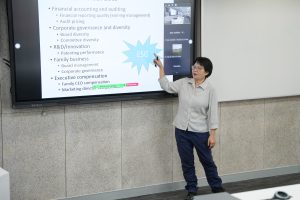 Centre for Consumer Research in India, under the aegis of Paari School of Business, recently organised a dynamic and contemporary five-day Faculty Development Program. This innovative program delved into cutting-edge topics, showcasing the forefront of consumer research.
Centre for Consumer Research in India, under the aegis of Paari School of Business, recently organised a dynamic and contemporary five-day Faculty Development Program. This innovative program delved into cutting-edge topics, showcasing the forefront of consumer research.
The hybrid-mode FDP witnessed enthusiastic participation from all PhD students and faculty members of PSB, fostering a vibrant environment of knowledge exchange. What added to the richness of this academic endeavor was the inclusion of 20 participants from various other prestigious B-schools.
Distinguished anchors for the FDP included luminaries in the field like Prof. Raj Sethuraman from Cox School of Business, Southern Methodist University; Prof. Ramkumar Janakiraman from Darla Moore School of Business, University of South Carolina; Prof. Piyush Sharma from the School of Management and Marketing, Curtin University, Australia; Prof. Tak Yan Leung, Associate Professor, School of Business and Creative Industries, University of the Sunshine Coast, Australia; Prof. Bharadhwaj Sivakumaran, Dean, Paari School of Business.
Speakers talked about new technologies in omni channel retail and big data in retailing, empirical models in Marketing. Then, Professors Piyush Sharma and Tak Yan Leung gave individual and personalized feedback to all participants on their research. Finally, Prof. Bharadhwaj Sivakumaran gave tips on how to publish papers on systematic literature reviews. All in all, it was a dream come true for participants; they soaked in a rich treasure trove of information from a globally acclaimed panel.
This collaborative initiative aimed to explore the evolving landscape of consumer research, bridging academic insights with real-world applications. The FDP not only enhanced the knowledge base of participants but also fostered a global network of scholars dedicated to advancing consumer research in India and beyond.
- Published in Departmental News, News, Paari Current Happenings
Scholarly Exploration into Nuanced Portrayal of Human Experiences
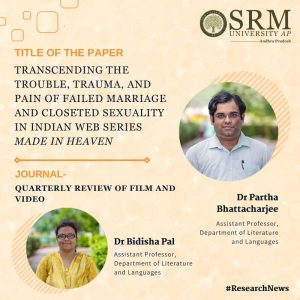 Dive into the realms of contemporary literature as our esteemed faculty members, Dr Partha Bhattacharjee and Dr Bidisha Pal from the Department of Literature and Languages presented their latest research endeavor. Their collaborative paper, titled “Transcending the Trouble, Trauma, and Pain of Failed Marriage and Closeted Sexuality in Indian Web Series Made in Heaven,” has found its home in the prestigious journal “Quarterly Review of Film and Video” (Scopus Q2).This scholarly exploration take into the portrayal of human experiences in the context of failed relationships and concealed identities within the framework of Indian web series. Join us in celebrating their insightful contributions to the literary discourse, reflecting SRM AP’s commitment to advancing knowledge and fostering academic excellence.
Dive into the realms of contemporary literature as our esteemed faculty members, Dr Partha Bhattacharjee and Dr Bidisha Pal from the Department of Literature and Languages presented their latest research endeavor. Their collaborative paper, titled “Transcending the Trouble, Trauma, and Pain of Failed Marriage and Closeted Sexuality in Indian Web Series Made in Heaven,” has found its home in the prestigious journal “Quarterly Review of Film and Video” (Scopus Q2).This scholarly exploration take into the portrayal of human experiences in the context of failed relationships and concealed identities within the framework of Indian web series. Join us in celebrating their insightful contributions to the literary discourse, reflecting SRM AP’s commitment to advancing knowledge and fostering academic excellence.
Abstract
Premiered as a television web series on Amazon Prime Video on 8th March 2019, Made in Heaven (2019) simultaneously unmasks the hypocrisies and lies of the big fat Indian weddings and breaks the taboo of homosexuality. In consecutive nine episodes, the plots and the subplots are beaded together to initiate a sensory sensitization towards the hypocrisy of marriages and insensitive homophobia. Carefully analyzing postulates from theorists this short article attempts to decode the trouble, trauma, and pain encoded in messy lifestyles, marriages, and relationships characterizing and wielding the lives as well as the sexuality of the characters in the web series
Explanation in Layperson’s Terms
The research revolves around the concept of marriage in Indian society as well as homosexuality in the Indian Hindi web series Made in Heaven (2019). The research shows how the various episodes of the web series showcase different aspects of marriage and the actual reality behind the pomp and pleasure of high-profile weddings within society. On the other hand sexuality and sexual desire are often hidden and do not get proper channelization in a person’s life. The desire thus remains suppressed and results in crisis in many forms. There are other intertwined concerns such as the dowry system, social disparity, impotency, virginity, and sexual molestations which weave a meta-narrative on the popular medium and raise consciousness regarding how people should react to those hazards and behave accordingly.
Practical Implementation and Social Implications of the Research
The research involves practical aspects such as the dowry system, social disparity, impotency, virginity, and sexual molestations which are part of our social lives. Many people have to face such things in their day-to-day lives. This research brings out such realities of society while analyzing the mental condition and psychology behind these. Moreover, this research also shows marriage is an important decision in a person’s life, it should be made in terms of love and respect, not based upon money and social status. The research visits practical examples and revisits the laws to substantiate the arguments. Popular media such as web series is not just a form of entertainment, but it can be a medium for building awareness.
- Published in English Current Happenings, News, Research News
Dr Karthik Rajendran Honoured with Young Scientist Award
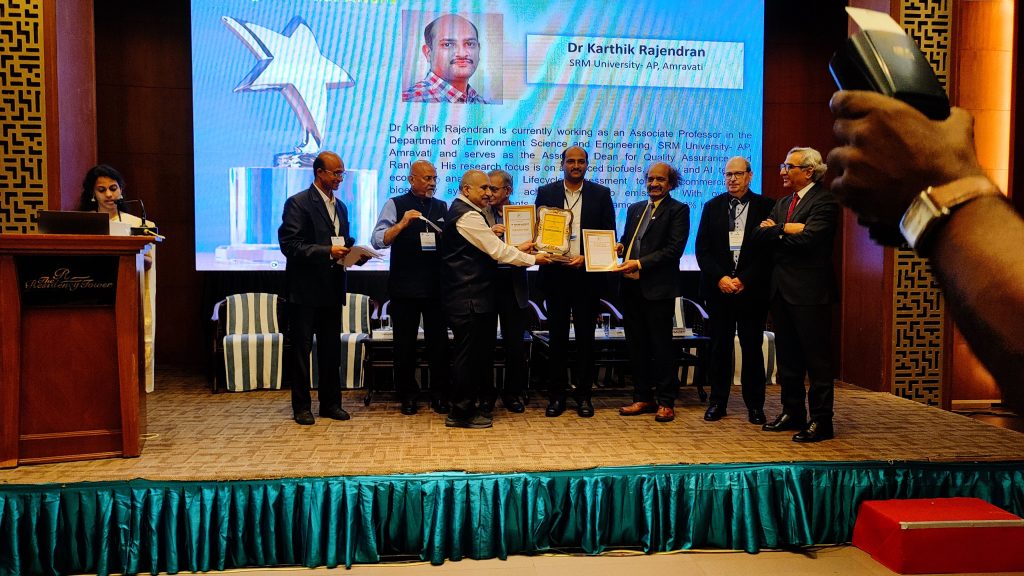
Dr Karthik Rajendran, Associate Professor, Department of Environmental Science & Engineering has been conferred with the Young Scientist Award from the Biotechnology Society of India. The award was received by Dr Karthik Rajendran from Padmashree Prof. GD Yadav (ICT Mumbai).
This prestigious award is given to scientists less than 35 years old for their work carried out in India. This is a testament to the work he has been doing at SRM University-AP for the last 4.5 years. The Jury of the award committee consisted of twenty-three experts across India and the Globe.
In the last 20 years of its inception, only once before such an award was given to any private institution.
- Published in Departmental News, ENVS News, News
MSc Environmental Science Students Attend Workshop on Sustainable Wastewater Management
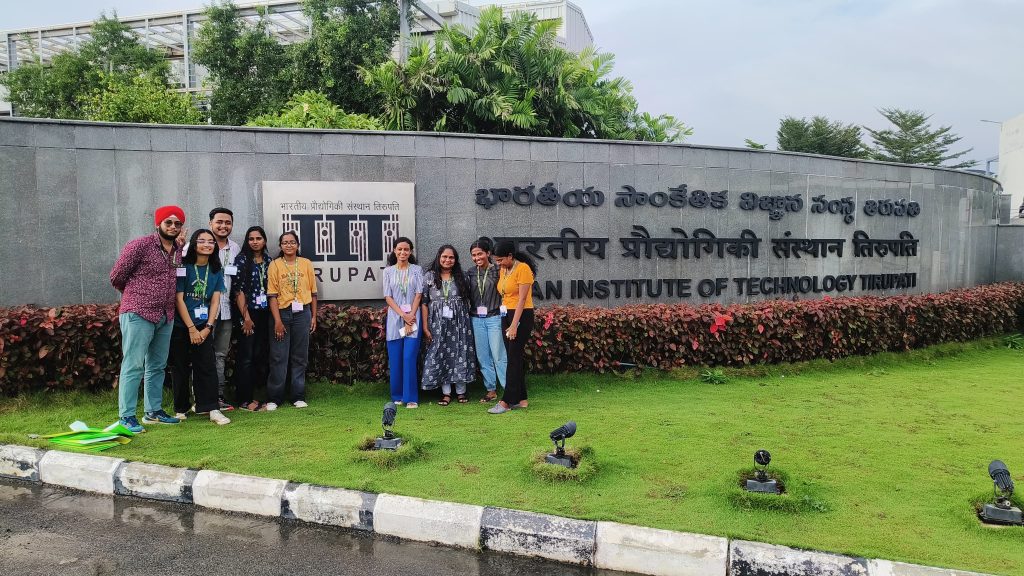
MSc Students from the Department of Environmental Science and Engineering had a delightful opportunity to participate in the Workshop on “Sustainable Wastewater Management: The Role of Advanced Treatment and Sensing Technologies” organised by the Department of Civil and Environmental Engineering, Indian Institute of Technology Tirupati on December 01 and 02, 2023. The students got to learn about novel technologies available for wastewater treatment and also visited three wastewater treatment plants at IIT Tirupati that showcased wastewater recycling technologies. Fruitful discussions with both academicians and industrial experts on current challenges in wastewater management and innovations and opportunities in the water sector were the highlights of the workshop.
- Published in Departmental News, ENVS News, News
Dr Karthik Rajendran Receives Hiyoshi Young Leaf Award
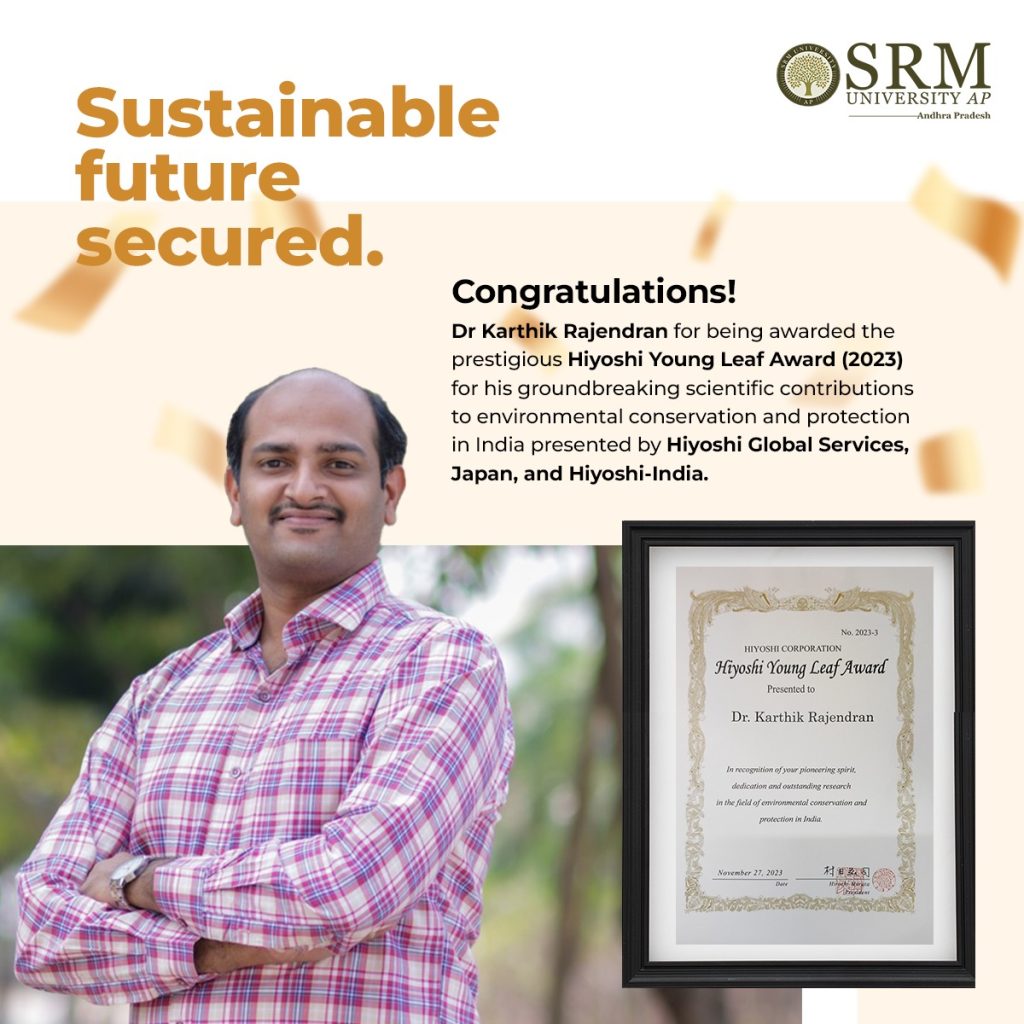
A proud moment for SRM University-AP as Dr Karthik Rajendran, Associate Professor in the Department of Environmental Science and Engineering, receives the prestigious Hiyoshi Young Leaf Award.
The Hiyoshi Young Leaf Award recognises novel, innovative, and outstanding scientific research and application in the field of environmental conservation and protection in India. Dr Rajendran’s dedication to research, innovative approaches, and impact on the academic community have earned him this esteemed accolade.
“We extend our heartfelt congratulations to Dr Karthik Rajendran for this well-deserved recognition,” said Prof. Manoj K Arora, Vice Chancellor, SRM University-AP. “His exemplary work reflects the varsity’s commitment to fostering excellence in the field of Environmental Science and Engineering.”
“It is a great honour to be receiving the Hyoshi Young Leaf Award, it motivates me further to work harder and with greater passion, I would like to thank Hiyoshi Corporation for presenting me with this award,” said Dr Karthik Rajendran.
Dr Rajendran has received several awards in the past for his remarkable contributions to the field of environmental science and engineering. He has been recognised as one of the top 2% of scientists by Stanford University and has also been honoured with the Young Scientist Award among others. Apart from his research, Dr Rajendran is also dedicated to educating the next generation of environmental scientists and engineers, thereby playing a crucial role in shaping future leaders in the field.
SRM University-AP celebrates this milestone in Dr Rajendran’s career and looks forward to continued excellence in his contributions to environmental science.
- Published in ENVS News, Faculty Achievements, News


